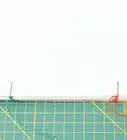wikiHow is a “wiki,” similar to Wikipedia, which means that many of our articles are co-written by multiple authors. To create this article, 47 people, some anonymous, worked to edit and improve it over time.
This article has been viewed 851,203 times.
Learn more...
Pop-up elements add an exciting new dimension to any book (sure wish textbooks had them). If you are looking for a craft to make for a young child you know (or anyone!), you can create your own pop-up book rather simply. All you need is a story, a couple of hours, and a few simple materials.
Steps
Planning
-
1Choose an interesting topic. The subject of your pop-up book should be kid-friendly if you plan on giving the book to a child. But what adult doesn't love a good 3D story?
- It can either be fiction or non-fiction. If choosing fiction, you can either go with a short yet classic folk tale or you can write your own story. If choosing non-fiction, look for a subject that a child might find appealing, like space, dinosaurs, or animals.
- You don't need to think of this as a tried-and-true "book." It can double as a letter, proposal, or a thoughtful addition to any gift.
-
2Keep things simple. Limit the number of pop-out elements you use to prevent your pages from looking cluttered or becoming too weak to stand. The fewer cuts you make in your pages, the more durable the pages will be.
- Feel free to add other craft elements to make it better. But even too many of these can make your pages look busy and weigh them down unnecessarily.
Advertisement -
3Plan the story out. Create a storyboard. Write the story or script out on notebook paper, separating it into different paragraphs or lines when you anticipate needing a new page. Sketch out a rough draft of the illustrations you want to use for each page.[1]
- Before you actually create the book, it is important that you know how many pages you will need along with how many pictures you will need and where to put them.
Construction and Design
-
1Fold a sturdy piece of paper in half. A 9-by-12-inch (23-by-30-cm) sheet of construction paper works well, but you can also use cardstock, thin poster paper, or scrap booking paper of just about any size.
- The paper must be thicker than an ordinary sheet of printer paper. Fold the paper in half horizontally to create the book's cover.
-
2Cut two parallel, horizontal slits in the center of the paper. The slits should be about 2 inches (5 cm) long and spaced about 1 inch (2.5 cm) apart. These slits will create a tab.[2]
- Open your paper. Position it vertically so that its height appears longer than its width. Use your finger or a thin pencil or pen to gently pry the tab forward.
-
3Make your illustrations. You can either draw and color the illustrations on separate sheets of construction paper or cardstock, or you can cut pictures from photographs, magazines, or recycled picture books and paste those pictures onto sturdier cardstock.
- Make sure that the pictures you create or use roughly correspond to the size of your book page. Also make sure that you have all the characters and images you need for your entire book, rather than the single page.
- Set aside an empty space at the bottom of the page for text. If you plan on having a child write the story out, you may want to use a ruler to draw lines to make it easier for him or her. You could also glue a portion of lined notebook paper in the space.
- If you plan on writing it out yourself, however, you can leave the space blank or print text out from your computer and paste it onto the page later.
-
4Create as many pages as necessary. Use the same folding and cutting technique to create as many pages as you need to bring the tale to an end.
- Review your story. Make sure that you have the illustrations and pictures planned out accurately as well as the text. Also make sure that you have enough pages created!
-
5Write in the text. Go through the pages and write or paste the text to the bottom of each page.
- If you have more text than you have room for, attach a piece of paper that folds out upon opening to the too-small text area. Problem solved!
-
6Decorate the background for each page. Sketch the background out in pencil before coloring it in with your coloring medium of choice. Leave the tabs blank.
- If you have a good eraser, go back and erase your pencil lines after completion.
Assembly
-
1Cut and paste your pictures onto the tabs. Cut out the pictures and illustrations you created. Glue the back of each one onto its corresponding tab. Do not allow it to get stuck to the background portion of the page, however. Then it won't pop!
- If you're using runny glue, be sure not to use too much. Apply the glue to the tab and not the picture; that way you won't risk getting glue above or below the tab.
-
2Glue your pages together. The pages need to be glued together back to back. The top outer half of the second page would be glued to the lower outer half of the first page. The top outer half of the third page would be glued to the lower outer half of the second page. Continue this pattern until all the pages are attached to one another.
- Do not glue any of the pop up tabs together, though, since doing so will prevent them from popping up.
-
3Create an outside cover. Fold a sheet of heavy paper that is slightly larger than the rest over the book. Slide the folded paper away from the book, decorate the back and front outer covers, and then glue the back and front inner covers to the first and last pages of the book.
- This, of course, is entirely optional. If you're using it as a story-like letter or other purpose, a cover may be unnecessary.
- Enjoy! Once the glue has dried completely, the book is ready to be read.
Community Q&A
-
QuestionWhat kind of glue should I use to make my pop up book?
 Community AnswerUse a good glue stick as that won't seep through the page and ruin your drawing (it doesn't wet the page like liquid).
Community AnswerUse a good glue stick as that won't seep through the page and ruin your drawing (it doesn't wet the page like liquid). -
QuestionWhat is the best type of paper to use and can colored cards be used for the base?
 Community AnswerCard stock or other thicker paper is advised and, yes, you can use colored cards.
Community AnswerCard stock or other thicker paper is advised and, yes, you can use colored cards. -
QuestionIs the cover supposed to cover the entire book?
 Community AnswerThe purpose of the cover is to cover the whole book and make it so glancing at the book won't cause people to already be reading the story. The whole book must be covered, but some can be sticking out, although it will look unprofessional.
Community AnswerThe purpose of the cover is to cover the whole book and make it so glancing at the book won't cause people to already be reading the story. The whole book must be covered, but some can be sticking out, although it will look unprofessional.
Things You'll Need
- Heavy paper
- Scissors
- Pencil and pen
- Colored pencils, crayons, paints, or markers
- Glue
- Ruler
References
About This Article
To make a pop-up book, start by folding a sturdy piece of construction paper in half and cutting 2 parallel, horizontal slits in the center of the paper to create a tab. You can follow the same process to create as many pages as you want. Next, write your text on the bottom half of each folded sheet and create the background on the top half. Then, draw your illustrations on separate pieces of paper, cut them out, and glue them to the tabs. Finally, glue the pages of your book together in the correct order. For tips on creating a cover for your book, read on!
-Step-17.webp)
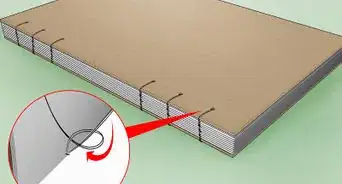
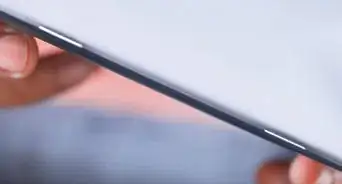
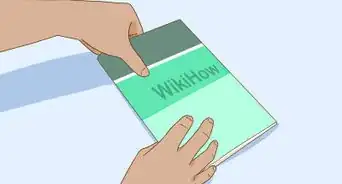
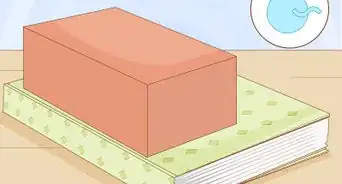
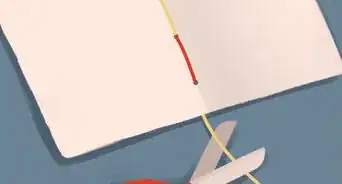






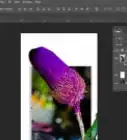
-Step-2-Version-3.webp)
-Step-17.webp)
